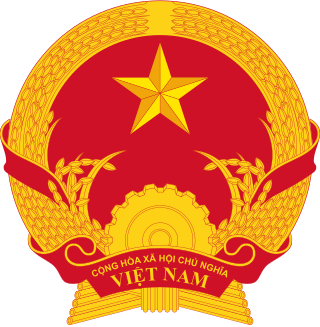
The politics of Vietnam is dominated by a single party under an authoritarian system, the Communist Party of Vietnam (CPV). The President of Vietnam is the head of state, and the Prime Minister of Vietnam is the head of government, both of these are separate from the General Secretary of the Communist Party of Vietnam who leads the CPV and is head of the Politburo and the Central Military Commission, thus the General Secretary is the de facto supreme leader of Vietnam. Executive power is exercised by the government and the President of Vietnam. Legislative power is vested in the National Assembly of Vietnam. The Judiciary is independent of the executive. The parliament adopted the current Constitution of Vietnam, its fifth, on 28 November 2013.

The Standing Committee of the National People's Congress (NPCSC) is the permanent body of the National People's Congress (NPC), the national legislature of China. Although the parent NPC officially has superiority over the Standing Committee, and certain authorities are not delegated, the Standing Committee is generally viewed to have more de facto power, as the NPC convenes only once a year for two weeks, leaving its Standing Committee the only body that regularly drafts and approves decisions and laws.
The government of Czechoslovakia under Marxism–Leninism was in theory a dictatorship of the proletariat. In practice, it was a one-party dictatorship run by the Communist Party of Czechoslovakia, the KSC.

The prime ministerof Vietnam, is the head of government of Vietnam who presides over the meetings of the Government. The prime minister directs the work of government members, and may propose deputy prime ministers to the National Assembly.

The president of the Socialist Republic of Vietnam is the head of state of Vietnam, elected by the Vietnam National Assembly from delegates of the National Assembly. Since Vietnam is a single-party state, the president is generally considered to hold the second highest position in the political system, formally after the general secretary of the Communist Party of Vietnam. In addition, the president appoints the head of government, the prime minister. As head of state, the President represents Vietnam both domestically and internationally, and maintains the regular and coordinated operation and stability of the national government and safeguards the independence and territorial integrity of the country.
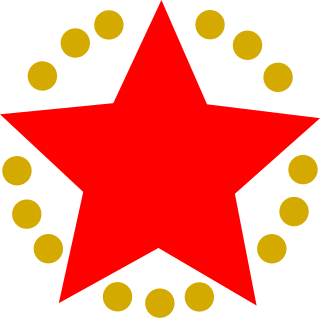
The Supreme People's Assembly is the highest organ of state power of North Korea. It is the only branch of government in North Korea, and per the principle of unified power, all state organs are subservient to it. It consists of one deputy from each of North Korea's 687 constituencies, elected to five-year terms.

The Council of State of the Republic of Poland was introduced by the Small Constitution of 1947 as an organ of executive power. The Council of State consisted of the President of the Republic of Poland as chairman, the Marshal and Vice-marshals of the Sejm, President of the Supreme Audit Office, and potential other members. The Council of State had the power to approve decrees issued by the Council of Ministers, exercise supreme control over the local national councils, approve promulgation of laws concerning the budget and military draft, declare a state of emergency and martial law, initiate legislation, and others.
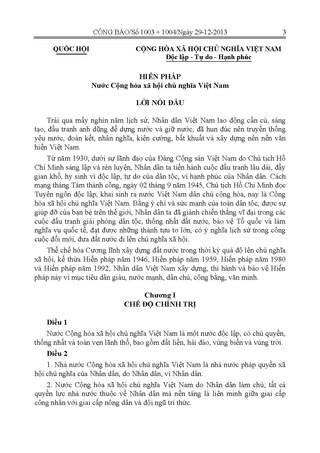
The Vietnamese Constitution or the Constitution of Vietnam, fully the Constitution of the Socialist Republic of Vietnam, is the fundamental and supreme law of the Socialist Republic of Vietnam. The current constitution was adopted on November 28, 2013, by the Thirteenth National Assembly, and took effect on January 1, 2014, being the third constitutions adopted by the Vietnamese state since the political reunification of the country in 1976.

The political system of the Soviet Union took place in a federal single-party soviet socialist republic framework which was characterized by the superior role of the Communist Party of the Soviet Union (CPSU), the only party permitted by the Constitution.
The German Democratic Republic was created as a socialist republic on 7 October 1949 and began to institute a government based on the government of the Soviet Union during the Stalin era. The equivalent of the Communist Party in East Germany was the Sozialistische Einheitspartei Deutschlands, which along with other parties, was part of the National Front of Democratic Germany. It was created in 1946 through the merger of the Communist Party of Germany (KPD) and the Social Democratic Party of Germany (SPD) in the Soviet Occupation Zone of Germany. Following German reunification, the SED was renamed the Party of Democratic Socialism (PDS), which eventually merged with the West German Electoral Alternative for Labor and Social Justice to form the modern Left Party.

The Prime Minister of the Lao People's Democratic Republic, formerly the chairman of the Council of Government of the Lao People's Democratic Republic, is the head of government of Laos. The highest position in the government, they direct the country's executive branch. The prime minister is accountable to the president, the National Assembly and the country's only legal party: the Lao People's Revolutionary Party (LPRP). The current prime minister is Sonexay Siphandone, who was elected in 2022.

The National Assembly of the Socialist Republic of Vietnam is the parliament and the highest body of state power of Vietnam. The National Assembly is the only branch of government in Vietnam and, in accordance with the principle of unified power, all state organs are subservient to it.
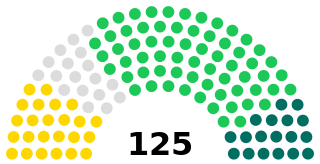
The Assembly is the unicameral legislature of Turkmenistan. Between March 2021 and 21 January 2023, it was the lower house of the National Council of Turkmenistan. It consists of 125 members, who are elected for five-year terms in single-seat constituencies.

The Great National Assembly was the supreme body of state power of the Socialist Republic of Romania. The Great National Assembly was the only branch of government in Romania, and per the principle of unified power, all state organs were subservient to it. After the overthrow of Communism in Romania in December 1989, the Great National Assembly was dissolved by decree of the National Salvation Front (FSN) and eventually replaced by the bicameral parliament, made up of the Chamber of Deputies and the Senate.
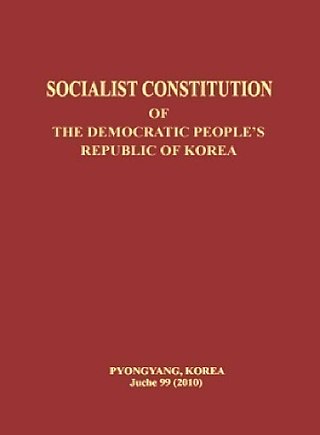
The Socialist Constitution of the Democratic People's Republic of Korea is the constitution of North Korea. It was approved by the 6th Supreme People's Assembly at its first session on 27 December 1972, and has been amended and supplemented in 1998, 2009, 2012, 2013, 2016, 2019 (twice), and in 2023. It replaced the country's first constitution which was approved in 1948.

The cabinet of Thailand is a body composed of thirty-five of the most senior members of the government of the Kingdom of Thailand. The cabinet is the primary organ of the executive branch of the Thai government. Members of the cabinet are nominated by the prime minister and formally appointed by the King of Thailand. Most members are governmental department heads with the title of "minister of state". The cabinet is chaired by the Prime Minister of Thailand. The cabinet is often collectively called "the government" or "the Royal Thai Government".
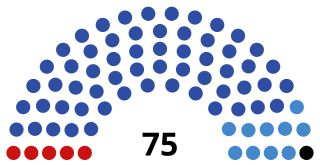
The State Council of Crimea is the parliament of Russian administered Republic of Crimea. It claims to be a continuation of the 'Supreme Council of Crimea' following a vote by the Ukrainian parliament to dissolve the Supreme Council of Crimea. The Parliament is housed in the Parliament building in the centre of Simferopol.

The Government of the Union of Soviet Socialist Republics (USSR) was the executive and administrative organ of the highest body of state authority, the All-Union Supreme Soviet. It was formed on 30 December 1922 and abolished on 26 December 1991. The government was headed by a chairman, most commonly referred to as the premier of the Soviet Union, and several deputy chairmen throughout its existence. The Communist Party of the Soviet Union (CPSU), as "The leading and guiding force of Soviet society and the nucleus of its political system" per Article 6 of the state constitution, controlled the government by holding a two-thirds majority in the All-Union Supreme Soviet. The government underwent several name changes throughout its history, and was known as the Council of People's Commissars from 1922 to 1946, the Council of Ministers from 1946 to 1991, the Cabinet of Ministers from January to August 1991 and the Committee on the Operational Management of the National Economy from August to December 1991.

The Cabinet of Democratic People's Republic of Korea or North Korea (Naegak) is, according to the Constitution of North Korea, the administrative and executive body and a general state-management organ in the Government of North Korea. The Cabinet's principal newspaper is Minju Choson.
The Presidium of the Supreme Soviet of the Ukrainian Soviet Socialist Republic, referred to between 1991 and 1996 as the Presidium of the Verkhovna Rada of Ukraine was the permanent body of the Supreme Soviet of the Ukrainian SSR then of the Verkhovna Rada, accountable to the Supreme Soviet in its activity, and, within the nominal limits prescribed by the Constitution of the Ukrainian SSR, performed functions of the highest state power in the Ukrainian SSR. It was first established by the constitution in 1937 to replace the Central Executive Committee of Ukraine. Its membership was elected for the first time on December 27, 1938, at the first session of the Supreme Soviet of the Ukrainian SSR. The presidium later became the permanent body of the post-Soviet legislature of Ukraine, the Verkhovna Rada, but was dissolved upon the adoption of the Constitution of Ukraine on June 28, 1996.
















